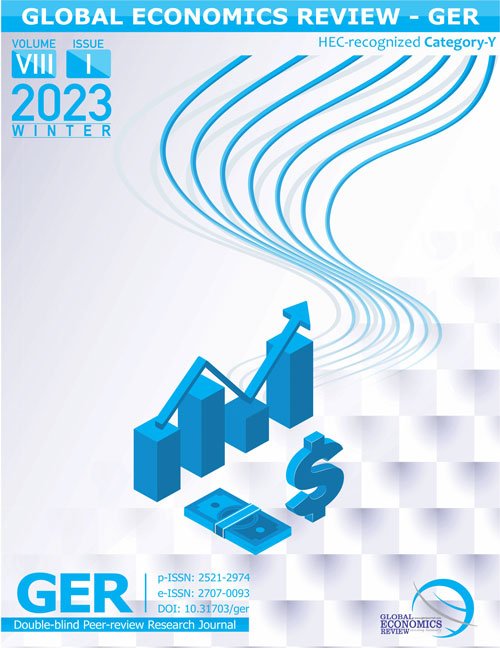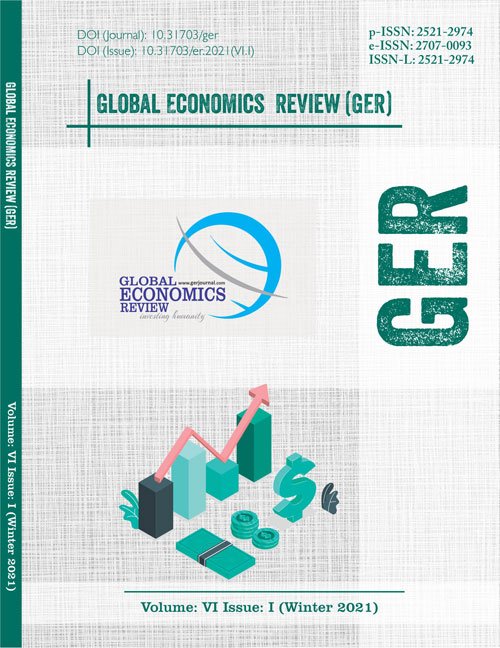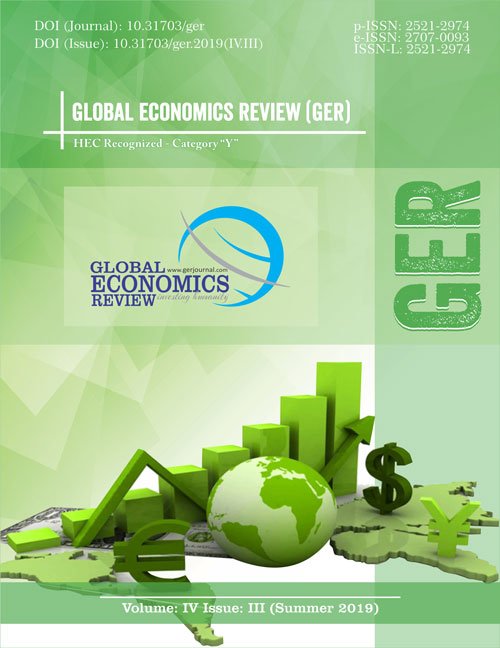01 - Fostering the Social Capital: Interplay of Public Relations and Democracy
http://dx.doi.org/10.31703/ger.2020(V-IV).0110.31703/ger.2020(V-IV).01 Published : Dec 2020
-
This article discusses fostering social capital as the result of interaction between Public Relations and democracy. Social capital is a collective benefit which results from the close cooperation of individuals or group of individuals through mutual interaction. Burt (2002) defined social capital as "the actual and potential resource that is embedded in available through, derived from social netw... Details
-
Social Capital, Public Relations, Democracy, Society
-
(1) Ali Hassan
Lecturer, Department of Media Studies, The Islamia University of Bahawalpur, Punjab, Pakistan.
(2) Rao Shahid Mahmood Khan
Assistant Professor, Department of Media Studies, The Islamia University of Bahawalpur, Punjab, Pakistan.
(3) Arsha Saleem Meer
Lecturer, Department of Mass Communication, Lahore College for Women University, Lahore, Punjab, Pakistan.
02 - The Impact of Public Spending on Poverty through the Channel of Social Infrastru
http://dx.doi.org/10.31703/ger.2020(V-IV).0210.31703/ger.2020(V-IV).02 Published : Dec 2020
-
This study empirically investigated the mediating role that education plays to channelize Public Spending towards Poverty alleviation in Asian economies. To capture the direct and indirect link between the main explained variable poverty and explanatory variable Public Spending, a relatively new methodology known as Moderated Mediation, has been adopted. For empirical analysis, Seemingly Unrelated... Details
-
Public Spending, Social Infrastructure, Poverty, Moderated Mediation Model, Asian Countries.
-
(1) Muhammad Akbar
PhD Scholar, Department of Economics, National University of Modern Languages, Islamabad, Pakistan.
(2) Sabahat Subhan
Assistant Professor, Department of Economics, National University of Modern Languages, Islamabad, Pakistan.
(3) Haidar Farooqe
Lecturer, Department of Economics, National University of Modern Languages, Islamabad, Pakistan.
03 - Trade Openness and Economic Growth Nexus in Pakistan
http://dx.doi.org/10.31703/ger.2020(V-IV).0310.31703/ger.2020(V-IV).03 Published : Dec 2020
-
This study explores the nexus amongst trade openness and economic growth for Pakistan for 1981-2019. Trade-openness is a dependent variable, and it is measured as imports plus exports to GDP ratio. Economic growth, Foreign Direct Investment, Inflation, Exchange rate, and interest rate are taken as explanatory variables. Co-integration approach by Johansen and Juselius (1988, 1991) has been used fo... Details
-
Economic Growth, FDI, Trade Openness, Inflation, Exchange Rate, Pakistan, Cointegration, ADF
-
(1) Ghulam Yahya Khan
Assistant Professor, Kashmir Institute of Economics, University of Azad Jammu & Kashmir, Muzaffarabad, Pakistan.
(2) Muhammad Masood Anwar
Women University of Azad Jammu & Kashmir, Bagh, Pakistan.
(3) Aftab Anwar
Assistant Professor, University of Education Lahore, Punjab, Pakistan.
04 - Assessing the influence of Corporate Governance, Ownership Concentration and Ban
http://dx.doi.org/10.31703/ger.2020(V-IV).0410.31703/ger.2020(V-IV).04 Published : Dec 2020
-
This empirical study examines the impact of corporate governance, ownership structure and bank size on the bank's performance and firm's value of the banking sector in Pakistan. The data is extracted for 17 commercial banks listed at the Pakistan Stock Exchange for the period of 2006-2016. The results show that corporate governance and bank size positively affect bank's performance while ownership... Details
-
Corporate Governance, Ownership Concentration, Bank Size, Bank's Performance, Firm's Value.
-
(1) Ihtesham Khan
Assistant Professor, Department of Finance, Abdul Wali Khan University Mardan, KP, Pakistan.
(2) Wisal Ahmad
Assistant Professor, Institute of Business Studies & Leadership, Abdul Wali Khan University Mardan, KP, Pakistan.
(3) Syed Arshad Ali Shah
Lecturer, Bacha Khan University, Charsadda, KP, Pakistan.
05 - Jurisdictional Determinants Of Investor-State Dispute Settlement: A Contemporary
http://dx.doi.org/10.31703/ger.2020(V-IV).0510.31703/ger.2020(V-IV).05 Published : Dec 2020
-
International Convention for the Settlement of Investment Disputes (ICSID) has incorporated a specialized jurisdiction under the auspicious of the World Bank Group. The convention has promulgated a standing offer for the investors of the contracting states to invoke ICSID jurisdiction on the fulfilment of some determinants. ICSID tribunals have amplified the application of these determinants to th... Details
-
Jurisdictional Determinants, State Dispute, Jurisdiction, Investor, Investment
-
(1) Ali Nawaz Khan
Assistant Professor, University Law College, University of the Punjab, Lahore, Pakistan.
(2) Naveed Ahmad
Assistant Professor, University Law College, University of the Punjab, Lahore, Pakistan.
(3) Bakht Munir
Lecturer, Institute of Languages and Linguistics, New Campus, University of the Punjab, Lahore, Pakistan.

 Volume X, Issue II (Spring 2025)
Volume X, Issue II (Spring 2025)  Volume IX, Issue III (Summer 2024)
Volume IX, Issue III (Summer 2024)  Volume IX, Issue II (Spring 2024)
Volume IX, Issue II (Spring 2024)  Volume IX, Issue I (Winter 2024)
Volume IX, Issue I (Winter 2024)  Volume VIII, Issue IV (Fall 2023)
Volume VIII, Issue IV (Fall 2023)  Volume VIII, Issue III (Summer 2023)
Volume VIII, Issue III (Summer 2023)  Volume VIII, Issue II (Spring 2023)
Volume VIII, Issue II (Spring 2023)  Volume VIII, Issue I (Winter 2023)
Volume VIII, Issue I (Winter 2023)  Volume VII, Issue IV (Fall 2022)
Volume VII, Issue IV (Fall 2022)  Volume VII, Issue III (Summer 2022)
Volume VII, Issue III (Summer 2022)  Volume VII, Issue II (Spring 2022)
Volume VII, Issue II (Spring 2022)  Volume VII, Issue I (Winter 2022)
Volume VII, Issue I (Winter 2022)  Volume VI, Issue IV (Fall 2021)
Volume VI, Issue IV (Fall 2021)  Volume VI, Issue III (Summer 2021)
Volume VI, Issue III (Summer 2021)  Volume VI, Issue II (Spring 2021)
Volume VI, Issue II (Spring 2021)  Volume VI, Issue I (Winter 2021)
Volume VI, Issue I (Winter 2021)  Volume V, Issue IV (Fall 2020)
Volume V, Issue IV (Fall 2020)  Volume V, Issue III (Summer 2020)
Volume V, Issue III (Summer 2020)  Volume V, Issue II (Spring 2020)
Volume V, Issue II (Spring 2020)  Volume V, Issue I (Winter 2020)
Volume V, Issue I (Winter 2020)  Volume IV, Issue IV (Fall 2019)
Volume IV, Issue IV (Fall 2019)  Volume IV, Issue III (Summer 2019)
Volume IV, Issue III (Summer 2019)  Volume IV, Issue II (Spring 2019)
Volume IV, Issue II (Spring 2019)  Volume IV, Issue I (Winter 2019)
Volume IV, Issue I (Winter 2019)  Volume III, Issue II (Fall 2018)
Volume III, Issue II (Fall 2018)  Volume III, Issue I (Spring 2018)
Volume III, Issue I (Spring 2018)  Volume II, Issue I (Fall 2017)
Volume II, Issue I (Fall 2017)  Volume I, Issue I (Fall 2016)
Volume I, Issue I (Fall 2016)